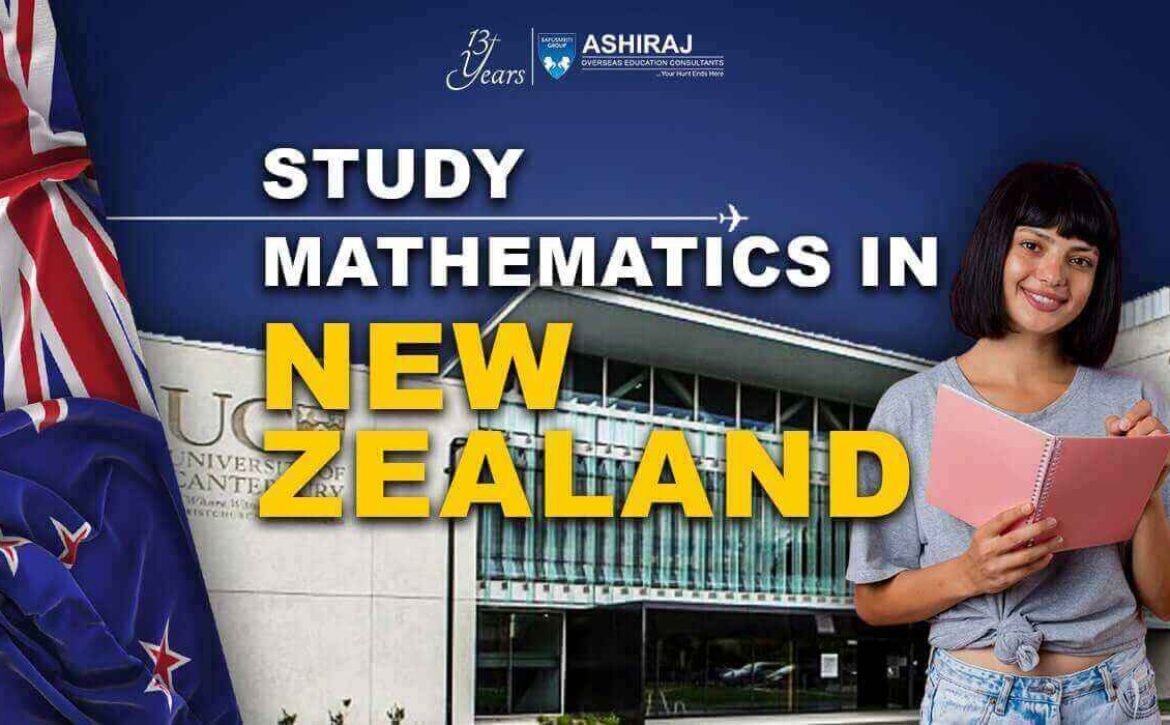
Mathematics in New Zealand
Mathematics in New Zealand is a multifaceted domain integral to the country’s educational framework and societal advancement. With a rich history of mathematical exploration and innovation, New Zealand fosters a culture that values numeracy and problem-solving skills. From early childhood education to tertiary research institutions, mathematics permeates various facets of New Zealand’s educational landscape, shaping the intellectual development of its populace.
In recent years, Mathematics in New Zealand has witnessed a paradigm shift towards interdisciplinary applications, with a focus on addressing contemporary challenges such as climate change, sustainable development, and technological advancements. Collaborative efforts between academia, industry, and government agencies have led to groundbreaking research initiatives, propelling New Zealand to the forefront of mathematical innovation on the global stage. As New Zealand continues to embrace the importance of mathematics in driving economic growth and societal progress, its commitment to nurturing mathematical talent and fostering a culture of inquiry remains steadfast.
Why to Study Mathematics in New Zealand?
- World-Class Education: New Zealand boasts top-tier universities renowned for their mathematics programs, providing students with access to world-class faculty and cutting-edge research opportunities.
- Multicultural Environment: Studying mathematics in New Zealand offers exposure to a diverse and inclusive learning environment, fostering collaboration and exchange of ideas among students from various cultural backgrounds.
- Interdisciplinary Opportunities: The mathematics curriculum in New Zealand emphasizes interdisciplinary applications, allowing students to explore connections between mathematics and fields such as engineering, computer science, and environmental science.
- Practical Learning: Mathematics education in New Zealand emphasizes hands-on, practical learning experiences, equipping students with the problem-solving skills necessary for real-world applications.
- Research Opportunities: With a thriving research community, New Zealand provides ample opportunities for students to engage in groundbreaking mathematical research, contributing to advancements in various fields.
- Quality of Life: Beyond academics, New Zealand offers an exceptional quality of life, with stunning natural landscapes, vibrant cities, and a strong sense of community, making it an ideal destination for studying mathematics.
- Global Recognition: A degree in mathematics from New Zealand is globally recognized and respected, opening doors to diverse career opportunities both locally and internationally.
In conclusion, studying mathematics in New Zealand offers a unique blend of academic excellence, cultural diversity, and practical learning experiences, making it a compelling choice for aspiring mathematicians seeking a rewarding educational journey.
Top Universities to Study Mathematics in New Zealand
University | QS World University Rankings 2023 | Type of University | Average Annual Fees | Programs Offered |
University of Auckland | 101-150 | Public | $25,600 | Mathematics, Applied Mathematics, Statistics |
University of Otago | 201-250 | Public | $23,000 | Mathematics, Mathematical Physics, Statistics |
Victoria University of Wellington | 251-300 | Public | $22,500 | Mathematics, Mathematical Physics, Operations Research |
University of Canterbury | 301-350 | Public | $24,000 | Mathematics, Applied Mathematics, Data Science |
Massey University | 401-450 | Public | $21,200 | Mathematics, Applied Mathematics, Financial Mathematics |
Studying mathematics in New Zealand presents a plethora of options with its top-tier universities renowned for their academic excellence. The University of Auckland stands out with its QS World University Rankings 2023 position ranging between 101-150. It offers programs such as Mathematics, Applied Mathematics, and Statistics, making it an ideal choice for aspiring mathematicians. Following closely is the University of Otago, ranking between 201-250, providing programs in Mathematics, Mathematical Physics, and Statistics at an affordable average annual fee of $23,000. Victoria University of Wellington, with its QS ranking of 251-300, offers programs like Mathematics, Mathematical Physics, and Operations Research at an average annual fee of $22,500, ensuring quality education accessible to students. Additionally, the University of Canterbury and Massey University provide excellent options for mathematics education with programs tailored to meet industry demands, fostering a conducive learning environment for students pursuing mathematics in New Zealand.
Course Curriculum for Mathematics in New Zealand
- Foundational Concepts: Mathematics courses in New Zealand start with foundational concepts, ensuring students grasp fundamental principles in areas like algebra, calculus, and geometry.
- Advanced Topics: As students progress, they delve into advanced topics such as differential equations, linear algebra, and complex analysis, providing a comprehensive understanding of mathematical theories and applications.
- Interdisciplinary Integration: The curriculum emphasizes interdisciplinary integration, incorporating mathematics into fields like engineering, computer science, and finance, preparing students for diverse career paths.
- Practical Applications: Mathematics courses in New Zealand prioritize practical applications, offering hands-on experiences through projects, case studies, and internships, equipping students with real-world problem-solving skills.
- Research Opportunities: Students have access to research opportunities, allowing them to collaborate with faculty on cutting-edge projects and contribute to the advancement of mathematical knowledge.
- Elective Specializations: The curriculum offers elective specializations in areas such as applied mathematics, statistics, and mathematical physics, enabling students to tailor their education to their interests and career goals.
- Industry-Relevant Skills: Mathematics programs in New Zealand focus on developing industry-relevant skills such as data analysis, modeling, and computational techniques, enhancing graduates’ employability in various sectors.
The course curriculum of Mathematics in New Zealand is designed to provide students with a solid foundation in mathematical principles, while also preparing them for the complexities of modern-day applications. With an emphasis on interdisciplinary integration, practical applications, and research opportunities, mathematics education in New Zealand equips students with the skills and knowledge needed to excel in a rapidly evolving global landscape.
Eligibility Criteria & Admission Requirements for MS in Mathematics in New Zealand
- Language Proficiency: Applicants must demonstrate proficiency in English by providing scores from either the IELTS or TOEFL exams. A minimum score of 6.5 in IELTS or 90 in TOEFL is typically required for admission.
- Standardized Tests: Candidates may need to submit scores from either the GRE or GMAT exams, depending on the university’s requirements. The minimum scores vary but generally range from 155-160 in the quantitative section for GRE and around 600-650 for GMAT.
- Academic Certificates: Applicants are required to submit academic certificates, including transcripts and diplomas, to demonstrate their prior education qualifications. These documents should showcase proficiency in mathematics-related subjects.
- Work Experience: While not always mandatory, some universities may consider relevant work experience in mathematics or related fields as a favorable factor during the admission process.
- Passport & Student Visa: International applicants must possess a valid passport and obtain a student visa to study in New Zealand. The visa application process requires submission of various documents, including proof of admission to a recognized educational institution.
Test | Minimum Score |
IELTS | 6.5 |
TOEFL | 90 |
GRE | 155-160 |
GMAT | 600-650 |
Ensuring compliance with the eligibility criteria for Mathematics in New Zealand is crucial for prospective students aiming to pursue their academic aspirations in this field. By meeting the requirements in language proficiency, standardized tests, and academic qualifications, individuals can enhance their chances of securing admission to reputable institutions and embarking on a rewarding educational journey in Mathematics in New Zealand.
Documents Required for Studying Mathematics in New Zealand
- Passport: A valid passport is essential for international students applying to study Mathematics in New Zealand. It serves as proof of identity and nationality throughout the application process and during the duration of the study program.
- Letters of Recommendation (LOR): Typically, two letters of recommendation from academic or professional sources are required. These letters provide insights into the applicant’s academic abilities, work ethic, and potential for success in the mathematics program.
- Statement of Purpose (SOP): The SOP is a personal essay that outlines the applicant’s academic background, career goals, and reasons for choosing to study Mathematics in New Zealand. It offers the opportunity to showcase motivation and suitability for the program.
- Curriculum Vitae (CV): A comprehensive CV detailing academic achievements, extracurricular activities, work experience, and any relevant skills or certifications is necessary. The CV provides a snapshot of the applicant’s qualifications and experiences.
- Official High School Transcripts and Educational Certificates: Transcripts and certificates from high school or secondary education institutions are required to demonstrate academic proficiency and fulfill prerequisite requirements for admission to Mathematics programs in New Zealand.
- Work Experience Certificate: If applicable, a work experience certificate verifying any relevant professional experience in mathematics or related fields may be requested.
- Proof of Financial Resources: International students must provide evidence of sufficient financial resources to cover tuition fees, living expenses, and other associated costs while studying Mathematics in New Zealand. This may include bank statements, scholarship letters, or sponsorship documents.
Ensuring the timely submission of these essential documents is crucial for a smooth application process and successful admission to Mathematics programs in New Zealand.
Admission Process for Mathematics in New Zealand
- Research: Begin by researching universities in New Zealand offering Mathematics programs. Consider factors such as academic reputation, program curriculum, and faculty expertise.
- Check Eligibility: Ensure you meet the eligibility criteria, including language proficiency (IELTS/TOEFL scores) and standardized test requirements (GRE/GMAT scores).
- Prepare Documents: Gather necessary documents, including passport, academic transcripts, letters of recommendation, statement of purpose, curriculum vitae, and proof of financial resources.
- Submit Application: Complete the university’s online application form and upload all required documents. Pay attention to application deadlines and ensure accuracy in filling out the form.
- Pay Application Fee: Pay the application fee as required by the university. This fee may vary depending on the institution and is non-refundable.
- Wait for Response: After submitting your application, wait for the university’s response. This may take several weeks to months, depending on the institution’s review process.
- Interview (if required): Some universities may require an interview as part of the admissions process. Prepare adequately and showcase your passion for Mathematics in New Zealand.
- Receive Offer: If successful, you will receive an offer of admission from the university. Review the offer carefully, including any conditions or requirements.
- Accept Offer: Once satisfied with the offer, accept it according to the university’s instructions. This may involve paying a deposit or confirming your intention to enroll.
- Apply for a Visa: After accepting the offer, apply for a student visa to study Mathematics in New Zealand. Follow the visa application process and submit all required documents.
Following these steps diligently can streamline the admission process for studying Mathematics in New Zealand, ensuring a smooth transition into your academic journey.
“Education is the most powerful weapon which you can use to change the world.”
Nelson Mandela
Cost of Mathematics Course in New Zealand
- Tuition Fees: The cost of tuition for Mathematics programs in New Zealand varies depending on the university and level of study. On average, international students can expect to pay between $20,000 to NZD 40,000 per year for undergraduate programs and $25,000 to NZD 45,000 per year for postgraduate programs.
- Living Expenses: In addition to tuition fees, students need to budget for living expenses such as accommodation, food, transportation, and personal expenses. On average, living expenses for international students in New Zealand range from $15,000 to NZD 20,000 per year.
- Health Insurance: International students are required to have health insurance coverage while studying in New Zealand. The cost of health insurance varies depending on the provider and coverage options but typically ranges from $600 to NZD 1,000 per year.
- Additional Costs: Other potential expenses include textbooks, course materials, student association fees, and extracurricular activities. These costs can vary depending on individual preferences and program requirements.
- Scholarships and Financial Aid: Mathematics in New Zealand offers scholarships and financial aid opportunities to help offset the cost of studying. Eligibility criteria and application deadlines vary, so students should research and apply for scholarships early.
Understanding the cost of studying Mathematics in New Zealand is essential for international students planning to pursue their academic goals in this field. By budgeting effectively and exploring financial aid options, students can manage their expenses and make the most of their educational experience in New Zealand.
Scholarships for Mathematics Courses in New Zealand
Scholarship Name | Amount (NZD) | Application Deadline |
New Zealand Excellence Awards | Up to $10,000 | Varies (usually between August and October) |
University of Auckland International Student Excellence Scholarship | Up to $10,000 | Varies (usually between September and November) |
University of Otago Doctoral Scholarships | Full tuition fees plus $27,000 stipend per annum | Varies (usually between September and December) |
Victoria University of Wellington Doctoral Scholarships | Full tuition fees plus $27,000 stipend per annum | Varies (usually between August and November) |
University of Canterbury College of Engineering International Scholarships | Up to $15,000 | Varies (usually between September and November) |
Scholarships play a crucial role in supporting international students pursuing Mathematics in New Zealand by alleviating financial burdens and enabling access to quality education. These scholarships offer various amounts of financial assistance, ranging from partial tuition waivers to full coverage of tuition fees and stipends. Additionally, application deadlines vary for each scholarship, typically falling between August and December. Prospective students interested in studying Mathematics in New Zealand should explore these scholarship opportunities and plan their applications accordingly to maximize their chances of receiving financial support for their academic journey.
Career Opportunities After Mathematics in New Zealand
Job Profile | Average Salary (NZD) |
Data Analyst | $60,000 – $90,000 |
Statistician | $70,000 – $100,000 |
Actuary | $80,000 – $120,000 |
Financial Analyst | $70,000 – $100,000 |
Operations Research Analyst | $65,000 – $95,000 |
Mathematics in New Zealand opens doors to diverse career opportunities with lucrative salary prospects. Graduates with a background in mathematics can pursue various job profiles, including Data Analysts, Statisticians, Actuaries, Financial Analysts, and Operations Research Analysts. Data Analysts, for instance, analyze large datasets to extract valuable insights, earning an average salary ranging from $60,000 to NZD 90,000 per year. Statisticians, on the other hand, focus on collecting and interpreting data to make informed decisions, with an average salary between $70,000 and NZD 100,000 annually. Actuaries, known for their expertise in risk assessment and financial forecasting, command salaries ranging from $80,000 to NZD 120,000 per year. Pursuing a career in mathematics in New Zealand not only offers intellectually stimulating roles but also provides substantial financial rewards, making it an attractive option for aspiring mathematicians.
Frequently Asked Questions About Mathematics in New Zealand
Some top universities in New Zealand offering Mathematics programs include the University of Auckland, University of Otago, Victoria University of Wellington, University of Canterbury, and Massey University.
Entry requirements typically include demonstrating proficiency in English (IELTS/TOEFL scores), providing standardized test scores (GRE/GMAT), submitting academic transcripts, and fulfilling any additional university-specific requirements.
Yes, there are various scholarships available for Mathematics students in New Zealand, offering financial assistance ranging from partial tuition waivers to full coverage of tuition fees and stipends.
Graduates of Mathematics programs in New Zealand can pursue careers as Data Analysts, Statisticians, Actuaries, Financial Analysts, Operations Research Analysts, and more, with lucrative salary prospects.
While prior work experience is not always mandatory, having relevant work experience in mathematics or related fields can be advantageous during the admission process and for future career prospects.
The duration of a Mathematics degree in New Zealand varies depending on the level of study. Generally, undergraduate programs take around three to four years to complete, while postgraduate programs may take one to two years.
Yes, there are ample opportunities for research in Mathematics in New Zealand, with universities offering research projects, collaborations with faculty, and access to state-of-the-art facilities.
The cost of studying Mathematics in New Zealand includes tuition fees, living expenses, health insurance, and additional costs such as textbooks and course materials. On average, international students can expect to pay between $20,000 to NZD 40,000 per year for tuition fees.
Yes, international students with a valid student visa are generally allowed to work part-time during their studies in New Zealand. However, there may be restrictions on the number of hours they can work per week.
To apply for a student visa to study Mathematics in New Zealand, international students need to meet visa requirements, including providing proof of enrollment in a recognized educational institution, sufficient funds to cover living expenses, and meeting health and character requirements.




